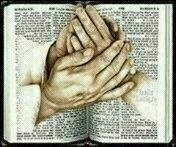Prayers of a man facing death

“I called out to the LORD in my distress, and he answered me.
From the belly of the underworld I cried out for help; you have heard my voice. You had cast me into the depths in the heart of the seas, and the flood surrounds me.
All your strong waves and rushing water passed over me.
So I said, ‘I have been driven away from your sight. Will I ever again look on your holy temple?
Waters have grasped me to the point of death; the deep surrounds me.
Seaweed is wrapped around my head at the base of the undersea mountains.
I have sunk down to the underworld; its bars held me with no end in sight.
But you brought me out of the pit.’ When my endurance was weakening, I remembered the LORD, and my prayer came to you, to your holy temple. Those deceived by worthless things lose their chance for mercy.
But me, I will offer a sacrifice to you with a voice of thanks.
That which I have promised, I will pay.
Deliverance belongs to the LORD!”
-Jonah 2:2-9 (CEB)
Jonah's prayer is present focused. He is honest about where he is at. In that terrible place, he is thankful. He should be dead, but he is alive. He should have been obedient, but he still has God. He is God's child and a worshiper of God. Jonah is talking to God about what just happened. He recalls how that as he was about to die, he called out to God, and God saved his life.
Jonah quotes 8 psalms (1) in his prayer. Maybe this is a good idea for us too, as Bill Johnson says to, "read the Psalms until you hear your own voice". Jonah probably had memorized a lot of scripture, which is not a bad idea. If you have the Word stored up in your heart and mind, it can be useful when you are in a crisis or when you are lending help to another who needs God's Word.
From the deep and from the grave, as it were, Jonah prayed and God heard his prayer. God can hear our prayers no matter where we are. Jonah describes his hopeless situation, yet he was still alive and could still pray. Jonah recounts how he is a worshiper of the one true God and thanks God. In the dire straights, Jonah thanks God. What was there to be thankful for? That he was alive and could offer one honest prayer before dying, that he is a child of God, and he is thankful to God for all of who God is and what God does in his goodness. At death's door, Jonah is thankful. Jonah is getting right with God.
Jonah had been disobedient and he caused a bunch of people to get into trouble with the storm. Only after he was found out did he admit it was his fault. He requested that the men cast him off, into the sea. Reluctantly and after trying to get him to shore, the men sent Jonah to a likely death in the sea. Then, the unexpected happened when the great fish came along and swallowed Jonah. Jonah lived. With whatever life he had left, Jonah prayed. He didn't curse God, but praised him for deliverance from death. He didn't know if death was only delayed, but having the ability to pray, that is what Jonah did. After his ordeal in the sea and being in the fish for 3 days, Jonah prayed.
When we are trapped by life's circumstances, will we see the goodness of God and pray with thankfulness? That trap or cave or desert might be God's life-preserver for you. Can we thank God in all circumstances? Can we come into God's presence with thanksgiving? If we are facing death, can we be thankful and re-commit to be obedient, even if we only have minutes, hours, or days left? That is what Jonah did. He had a change of heart.
He also renews his promise to God. He does not strike a bargain, nor does he negotiate. He does not say, "if you", but just, "I will". I will keep my promise. He had not obeyed God earlier, but ran from God. Now, he says he will keep his promise. Jonah's heart has changed. Jonah's will has changed. His second to last words were going to be, "I'll be obedient now!"
Perhaps Jonah mused that God was going to give him a second chance? Jonah might have thought that God saved him from drowning for a reason and that God wanted a response from Jonah and what would it be? Jonah dug down deep within himself and prayed the scriptures he knew and sewed them together into a personal prayer.
Jonah's last words were not, "woe is me"; but, "deliverance belongs to the Lord". That was going to be his heart's final resting place. When we pray, how do we park it with God at the end? It is wise to surrender all and be worshipful at death. It is always good to have a thankful posture towards God and end up standing on words of God's faithfulness and goodness and powerfulness.
1. Psalm 3, 120, 118, 88, 42, 31, 69, and 50
Comments
Post a Comment